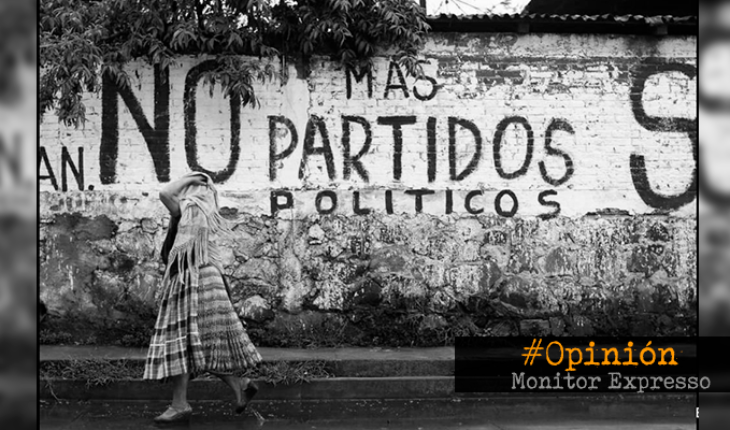By: Pavel Uliánov Guzman
Historically, the Government and Congress of the State of Michoacán, have systematically and irresponsibly shortened the budget for “the integral and sustainable development of indigenous peoples”, from 114 million allocated in 2014, to 25 million earmarked for 2020, deepening the conditions of discrimination, poverty and social exclusion of the original communities.
In short, regardless of the political affiliation of the government in turn, the Government and Congress of Michoacán have closed 80% the budget dedicated to the care of the native communities. At the initiative of the Governor, deputies from all political parties have historically approved budgets that are detrimental to indigenous communities.
In the historical development, the budget for the “integral and sustainable development of indigenous peoples and communities”, either through the defunct Secretariat of Indigenous Peoples or the created State Commission for the Development of Indigenous Peoples, has suffered a brutal reduction, during 2014, the Government of Michoacán and the Congress of the State of Michoacán, allocated the amount of $114,043,717; in 2015 the budget was $108,852,089; by 2016 the amount was reduced to $103,627,453; in 2017 capital declined to $68,465,885; for 2018, the budget was for the amount of $22,409,289; by 2019, capital increased a little bit, to the total of $47,219,815 and finally for 2020, the amount of $25,470,102 was allocated (Source: Budget of Egress of the Government of the State of Michoacán de Ocampo, for Fiscal Year 2014, 2015, 2016, 2017, 2018,2019 and 2020).
In all years, the budget reserved to meet the needs of indigenous communities has not reached even 0.3% of the total budget allocated to state units, it is clearly a miserable capital. Just as an example, by 2020, the capital of $25,470,102 represents 0.03% of the total Government Of government budget amounting to the amount of $75,914,903,948, “even the zoo will have more budget than attention to indigenous communities and peoples in Michoacán” with a budget of 39,660,849 (Patricia Monreal / By 2020 to low rural development and attention to migrants and indigenous peoples in Michoacán). Under this framework, the State Commission for the Development of Indigenous Peoples maintains a budget that will only serve to pay for a mivery indigenous bureaucracy and folded to the governor in turn.
These budgets are highly discriminatory, poor and unfair to the communities originating in Michoacán, because they do not correspond to the number of inhabitants who speak a mother tongue, which amounted in 2010 to the number of 136,608 people, equivalent to 3.5% of the total population of Michoacán (Population And Housing Census 2010/INEGI). That is, according to their number of inhabitants, the original peoples would be responsible for 3.5% of the total Budget of The Egress of the State Government, this in the least case and without observing the constitutional criteria of awareness of indigenous identity, self-identity and self-registration, which would raise more than 600 thousand to the inhabitants of the indigenous peoples.
The declining budget for the original communities, began with the administration of Fausto Vallejo Figueroa and was exacerbated with the government of Silvano Aureoles Conejo, in complicity with LXXII, LXXII and LXXIV Legislatures, this despite maintaining a historical debt to the native communities, are the most discriminated against among the discriminated against, the most excluded among the excluded and the poorest among the poor, according to the official sources themselves, 7 out of 10 indigenous people are in poverty, which equivalent to 8.3 million inhabitants of the indigenous peoples in the marginalization, of which 3.2 million, 28% are in extreme poverty with three or more social deficiencies and no economic capacity to acquire the basic food basket.
(CONEVAL / Social Development Policy Assessment Report 2018). Similarly, 8 out of 10 homes in which an indigenous-speaking person lives maintains housing lag, 19.9% lacks water in the house, 26.6% has no drainage to the public grid, and 13.9% maintain housing with land floors (INEGI / Intercensal Survey 2015). In short, the Mexican State has not contributed qualitatively to solving the structural problems of poverty, exclusion and marginalization in which millions of inhabitants of the native peoples live.
In perspective, the mexican state’s public policies for native communities are inadequate, discriminatory, paternalistic and violating rights. They are insufficient because they do not correspond to their number of inhabitants, are discriminatory because they prioritize the development of cities to the detriment of communities, are paternalistic because they exclude the indigenous population in the elaboration of public policies, and are violatory rights because they do not consult them in a prior, free, informed, culturally appropriate and binding way on administrative or legislative measures that affect them.
In fact, beyond the official language, the decrease in the budget allocated for the care of the original communities, demonstrates a social shortsightedness of the rulers and congressmen in turn, a total lack of vision, interest and support for the original peoples, since in no way, they allocate sufficient capital for the attention and resolution of the ancestral problems of the original communities.
In this sense, the only way they leave indigenous communities is social mobilization to demand their rights and obtain social claims.
Twitter: @PavelUlianov
Email: [email protected]
Facebook: www.facebook.com/PavelUlianov
The opinions expressed in the columns are the sole responsibility of those who subscribe to them and do not necessarily represent the thought or editorial line of Monitor Expresso





